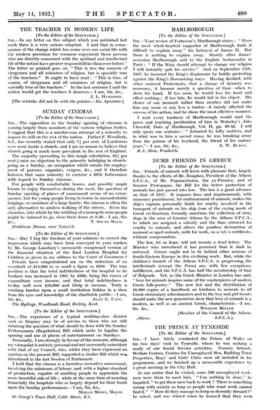MARLBOROUGH
[To the Editor of the Sem...TA:ma.]
SIR,—Your review of Forteseue's Marlborough states : " Even the most whole-hearted supporter of Marlborough finds it difficult to explain away" his betrayal of James II. But there is nothing to explain away. Shortly after James' accession Marlborough said to the English Ambassador in Paris : "If the King should attempt to change our religion I will instantly quit his service." And on September 15th, 1687, he incurred the King's displeasure by boldly protesting against the King's Romanizing ways. Having decided, with other eminent Protestants, that a change of dynasty was necessary, it became merely a question of time—when to show his hand. If too soon, he would lose his head and effect nothing ; if too late, he would fail in his object. His choice of one moment rather than another did not make him any more or any less a traitor—it merely affected the success of his action, and he chose the most effective moment.
I wish every traducer of Marlborough would read the grave and touching justification of him in Wolseley's John Churchill, Duke of Marlborough, Vol. 11, pp. 3942. I will only quote one sentence : "Actuated by lofty motives, and in what was to him a sacred cause, he was breaking away from the patron of his boyhood, the friend of his mature




































 Previous page
Previous page